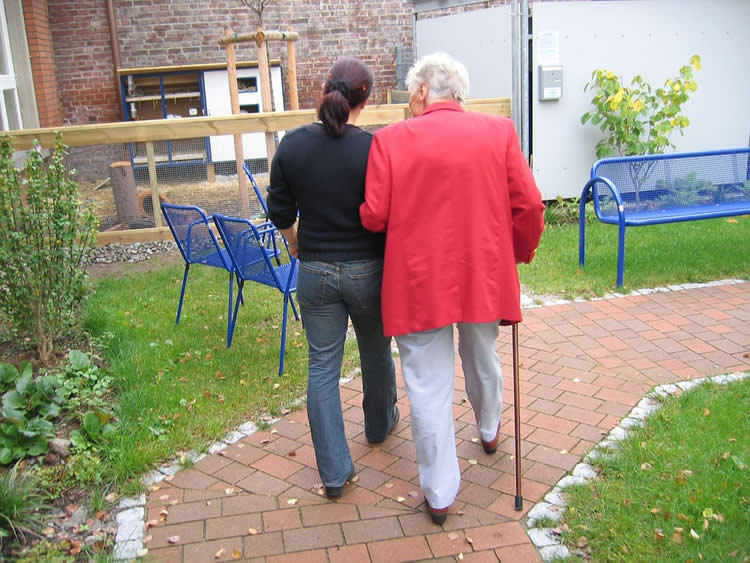People with early-stage dementia benefit when they are empowered to manage their own condition, a study led by researchers at the University of Exeter has found.
Research involving Bangor University and published in the journal International Psychogeriatrics, found that attending weekly ‘self-management’ group sessions which encouraged socialisation, discussion, problem solving and goal setting fostered independence and promoted social support amongst people with dementia.
The groups, led by trained facilitators, were focused on providing people with a better understanding of their dementia and ways to cope with it. Participants were supported in their ability to manage their own symptoms, treatment and lifestyle changes with information and expert help. They were then encouraged to share ideas and strategies for dealing with their condition and were encouraged to record notes and reminders in a handbook.
“Developing dementia can be a scary and isolating experience. We developed a group programme to help people with dementia manage their condition and find ways of dealing with the changes in their lifestyle. We found early evidence that empowering people to manage their own symptoms and bringing them together helped them feel more confident about managing everyday life with dementia,” said lead researcher Dr Catherine Quinn, Senior Research Fellow in The Centre for Research in Ageing and Cognitive Health (REACH).
“All this has helped to enhance their quality of life. The group members became friends and supported each other, and we found that they benefited from being able to learn from each other.”
The pilot randomised controlled study, which was funded by Health and Care Research Wales, compared a group of people with early stage dementia who attended the 90-minute sessions for eight weeks to a group who received no intervention.

The impact of the sessions was assessed by interviews with people with dementia and their caregivers after three months and then again after six. Results showed that participants benefitted from the facilitator support, information and help provided, and became better able to help themselves and found support in other group members.
“We will need to carry out a larger scale trial to obtain more definitive evidence, but our initial results indicate that enabling people with dementia to take control and manage their condition can be beneficial,” added Dr Quinn.
Source: Louise Vennells – University of Exeter
Image Credit: The image is in the public domain
Original Research: Abstract “A pilot randomized controlled trial of a self-management group intervention for people with early-stage dementia (The SMART study)” by Catherine Quinn, Gill Toms, Carys Jones, Andrew Brand, Rhiannon Tudor Edwards, Fiona Sanders and Linda Clare in International Psychogeriatrics. Published online December 17 2015 doi:10.1017/S1041610215002094
Abstract
A pilot randomized controlled trial of a self-management group intervention for people with early-stage dementia (The SMART study)
Background: Self-management equips people to manage the symptoms and lifestyle changes that occur in long-term health conditions; however, there is limited evidence about its effectiveness for people with early-stage dementia. This pilot randomized controlled trial (RCT) explored the feasibility of a self-management intervention for people with early-stage dementia.
Methods: The participants were people with early-stage dementia (n = 24) and for each participant a caregiver also took part. Participants were randomly allocated to either an eight-week self-management group intervention or treatment as usual (TAU). Assessments were conducted at baseline, three months and six months post-randomization by a researcher blind to group allocation. The primary outcome measure was self-efficacy score at three months.
Results: Thirteen people with dementia were randomized to the intervention and 11 to TAU. Two groups were run, the first consisting of six people with dementia and the second of seven people with dementia. There was a small positive effect on self-efficacy with the intervention group showing gains in self-efficacy compared to the TAU group at three months (d = 0.35), and this was maintained at six months (d = 0.23). In terms of intervention acceptability, attrition was minimal, adherence was good, and satisfaction ratings were high. Feedback from participants was analyzed with content analysis. The findings suggest the positive aspects of the intervention were that it fostered independence and reciprocity, promoted social support, offered information, and provided clinician support.
Conclusions: This study has provided preliminary evidence that self-management may be beneficial for people with early-stage dementia.
“A pilot randomized controlled trial of a self-management group intervention for people with early-stage dementia (The SMART study)” by Catherine Quinn, Gill Toms, Carys Jones, Andrew Brand, Rhiannon Tudor Edwards, Fiona Sanders and Linda Clare in International Psychogeriatrics. Published online December 17 2015 doi:10.1017/S1041610215002094






